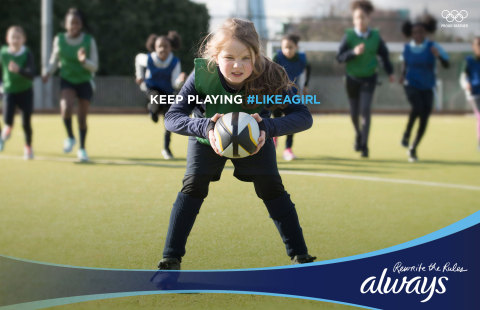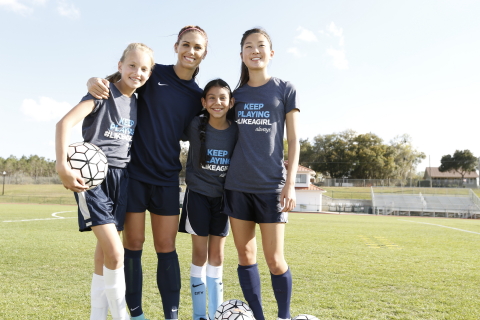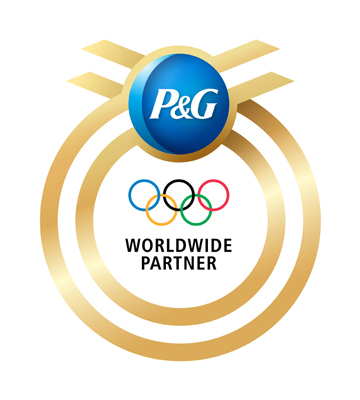CINCINNATI--(BUSINESS WIRE)--How many times have we heard comments like “girls shouldn’t play that sport” or seen girls’ teams playing in half-filled arenas? What impact does this have on girls and their desire to play sports throughout puberty? These are critical questions that Always, leader in global feminine care and the brand committed to championing girls’ confidence, is asking about sports – an activity recognized for its profound and long-term impact in helping girls build and maintain confidence. As the world prepares for the Rio 2016 Olympic Games, Always wants to urge, encourage and inspire girls everywhere to Keep Playing #LikeAGirl.
Data from the most recent Always Confidence & Puberty Survey*, shows that by the end of puberty, half of girls surveyed (51 percent) will have quit sports. To help shed light on this issue, Always partnered with Academy Award-nominated documentary filmmaker Nanette Burstein to find out how girls feel about playing sports. The new #LikeAGirl video, asked girls about their athletic experiences, the challenges and the benefits, what helped them stay in the game, or what led them to quit. Hear their stories and be motivated by their passionate rallying call for all girls to keep playing by watching the Always Keep Playing #LikeAGirl video here: https://www.youtube.com/watch?v=Emawq64b0DU
U.S. soccer star and Olympic gold medalist Alex Morgan is partnering with Always #LikeAGirl to share her own story and encourage girls to keep playing sports. “At age thirteen one of my coaches told me that I wasn’t good enough. As a young girl just wanting to play and do my best, that was difficult to hear. It would have been easy for me to quit - but I wouldn’t be the confident person I am today if I had,” said Morgan. “That’s why I am proud to be part of the Always #LikeAGirl mission to help keep girls confident at puberty by inspiring them to keep playing sports.”
Many studies have found that ongoing participation in sports is a high contributor to confidence in girls, at any level, and provides valuable skills to help them stay confident to do any and every thing later in life. In fact, a recent 2015 U.S. consumer data study, showed that women ages 18 to 24 are twice as likely to be confident if they play sports regularly, compared to those who do not play at all1. Additionally, the recent Always survey found that girls reported that three of the top benefits of staying in sports are increased confidence, teamwork, and leadership skills. However, despite the known benefits, girls still report that they don’t feel like they belong in sports. Further, 67 percent of girls feel that society does not encourage them to play sports.
“The Olympic Games are a time when - all around the world - female sports participation is elevated in the public eye, and for that reason, we could not think of a better moment to drive awareness of the critical role sports play in building girls’ confidence,” said Michele Baeten, Always Associate Director, Procter & Gamble. “We will rally and unite Olympic athletes, the International and National Olympic Committees and other organizations, to spark a change and inspire a world in which every girl truly feels that she can play sports and will Keep Playing #LikeAGirl!”
Always is inviting everybody to join in to rewrite the rules and keep girls in sports. Pledge that you’ll Keep Playing #LikeAGirl and encourage others to do the same. Upload a picture, shoot a video or tweet using #LikeAGirl to show your support and inspire young girls everywhere to Keep Playing sports.
Key ‘Always Puberty & Confidence Wave IV’ Study Findings
- By age 17, at the end of puberty, more than half of girls (51%) will have quit sports
- 7 out of 10 girls who quit sports during puberty felt they did not belong in sports
- Only 1/3 of girls feel that society encourages girls to play sports
- Three of the top benefits of staying in sports girls reported are increased confidence (62%), teamwork (64%) and leadership skills (54%)
About Always #LikeAGirl
The Always #LikeAGirl movement is being fueled by the millions of girls around the world who are changing #LikeAGirl to mean amazing things. The Always #LikeAGirl campaign launched in June 2014 was inspired by the insight that the start of puberty and the first period mark the lowest moment in confidence for girls and how harmful words can add to that drop in confidence. It demonstrated the profound effect the phrase “like a girl” can have on girls’ self-confidence and it inspired a movement, which has started to change public perception: after seeing the #LikeAGirl video, most people (76 percent of women ages 16 to 24 and 59 percent of men) said the video changed their perception of the phrase “like a girl,”*** according to the Always Puberty & Confidence Wave II Study. But it could not stop there. In 2015, a new Always study revealed that 72 percent of girls feel society limits them by telling them what they should and should not do or be. And more than half of girls felt that societal limitations would be the same or worse ten years from now, showing a lack of hope for change.** Always could not accept that and launched the Unstoppable #LikeAGirl campaign to empower all girls to show the world that they could do or be anything and everything. For more information about the #LikeAGirl movement, visit www.always.com.
Survey Methodology
*The Always Confidence & Puberty Wave IV Study was conducted by MSLGROUP Research utilizing Research Now Panels that surveyed a total of 1,514 Americans. There was a nationally representative sample group of 1,006 females aged 16 to 24 year old and 508 males aged 16 to 24. The survey was implemented between the dates of December 30, 2015 through January 7, 2016.
**The Always Confidence & Puberty Wave III Study was conducted by MSLGROUP Research utilizing Research Now Panels that surveyed a total of 1,800 Americans (1,300 American females aged 16 to 24 years old and 500 American males aged 16 to 24). There was a nationally representative sample group of 1,000 females and 500 males as well as an additional boost of 150 African American and 150 Hispanic American females. The survey was implemented between the dates of April 30, 2015 through May 8, 2015.
***The Always Confidence & Puberty Wave II Study was conducted by MSLGROUP using the Research Now Panel that surveyed a total of 1,800 Americans (1,300 American females aged 16 to 49 years old and 500 American males aged 16 to 49). There was a nationally representative sample group of 1,000 females and 500 males as well as an additional boost of 150 African American and 150 Hispanic American females. The survey was implemented between the dates of December 5, 2014 through December 12, 2014.
About Always
Always®, the world's leader in feminine protection, offers a wide range of feminine pads, wipes and liners designed to fit different body types, period flows and preferences. The Always line of feminine products includes Always Infinity™, Always Ultra Thins, Always Maxis, Always Liners and Always Feminine Wipes. Please visit www.always.com for more information.
About Procter & Gamble
P&G serves consumers around the world with one of the strongest portfolios of trusted, quality, leadership brands, including Always®, Ambi Pur®, Ariel®, Bounty®, Charmin®, Crest®, Dawn®, Downy®, Fairy®, Febreze®, Gain®, Gillette®, Head & Shoulders®, Lenor®, Olay®, Oral-B®, Pampers®, Pantene®, SK-II®, Tide®, Vicks®, and Whisper®. The P&G community includes operations in approximately 70 countries worldwide. Please visit http://www.pg.com for the latest news and information about P&G and its brands.
______________________________
1 Simmons Fall 2015
NHCS Adult Study 12-Month (U.S. Consumer Data)








